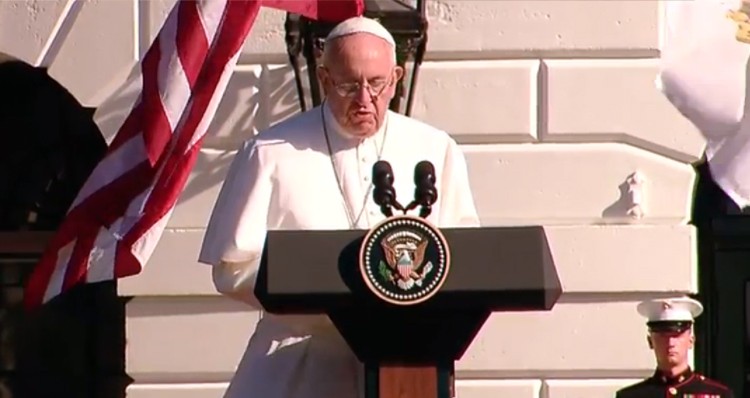
Pope Francis has effectively bridged the gap between science and religion with his recent encyclical1 on the environment. As he puts it, a shift in our moral understanding is key to winning the fight against climate change. As we reported last month, the Pope’s views on the environment and climate change have been made quite clear and, according to Religious News Service, the encyclical is a “major teaching document on the the environment” that accepts the reality of climate change and mankind’s role in it. This document has “led to the consternation of many conservatives” who tried to “blunt the document’s impact even before it [was] published.”
Honduran Cardinal Oscar Rodriguez Maradiaga, a top adviser to Francis, said of the encyclical, “Do not expect statistics or numbers or theories,” noting that Pope Francis “will go directly to the responsibility of all the baptized, especially with creation. Because all of us have responsibility,” he said – adding, “I am clear. We cannot continue playing with creation and contaminating the Earth.”
President Obama welcomed Pope Francis to the White House Wednesday morning amid the cheers of thousands who gathered to greet the pontiff for his historic first trip to the United States.
Mother Jones reports that:
During his first address in the United States, Francis pulled no punches when talking about one of the defining issues of his leadership, calling on Americans to protect our “common home” and act on climate change with a sense of urgency—a stance that many Republicans have criticized.
Speaking in slow but forceful English, Pope Francis told the crowd that:
I find it encouraging that you are proposing an initiative for reducing air pollution. Accepting the urgency, it seems clear to me also that climate change is a problem which can no longer be left to a future generation. When it comes to the care of our common home, we are living at a critical moment of history.
Pope Francis went on to state that:
We know by faith that the Creator does not abandon us; he never forsakes his loving plan or repents of having created us. Humanity still has the ability to work together in building our common home.
As The Guardian reported on Tuesday, Democrats are hopeful that the Pope’s visit will lead to the end of Republicans denying the reality of climate change in Congress.
Pope Francis’s arrival in Washington on Tuesday has reinforced hopes that one of the last great bastions of climate change denial – the US Congress – may be on the verge of crumbling.
The Guardian went on to report that: “Democratic leaders in Congress and environmental campaigners were optimistic that Francis would keep the focus on his core themes of the global economic order, poverty and environmental degradation over the next six days, and so widen the emerging fractures in the Republican wall of denial,” adding that: “Sheldon Whitehouse, the Democratic senator from Rhode Island, said he believed the call to action from a popular pope made it increasingly difficult for Republicans to continue to dismiss the science on climate change.” Whitehouse told The Guardian that “I think this whole edifice of climate denial is crumbling.”
You can watch the Pope speaking about climate change at the White House in the video, below:
https://youtu.be/RqjwWOgvYGM?t=1h5m45s
![]()
FOOTNOTE 1: A per PapalEncyclicals.net,
A Papal Encyclical is the “name typically given to a letter written by a Pope to a particular audience of Bishops. This audience of Bishops may be all of the Bishops in a specific country or all of the Bishops in all countries throughout the world.”
The 1917 Catholic Encyclopedia entry on Bulls and Briefs further explains other papal documents:
“In official language papal documents have at all times been called by various names, more or less descriptive of their character. For example, there are “constitutions,” i.e., decisions addressed to all the faithful and determining some matter of faith or discipline; “encyclicals,” which are letters sent to all the bishops of Christendom, or at least to all those in one particular country, and intended to guide them in their relations with their flocks; “decrees,” pronouncements on points affecting the general welfare of the Church; “decretals” (epistolae decretales), which are papal replies to some particular difficulty submitted to the Holy See, but having the force of precedents to rule on all analogous cases. “Rescript,” again, is a form applicable to almost any form of Apostolic letter which has been elicited by some previous appeal, while the nature of a “privilege” speaks for itself. But all these, down to the fifteenth century, seem to have been expedited by the papal chancery in the shape of bulls authenticated with leaden seals, and it is common enough to apply the term bull even to those very early papal letters of which we know little more than the substance, independently of the forms under which they were issued.“

You must be logged in to post a comment Login